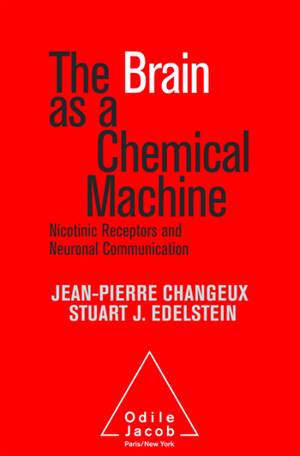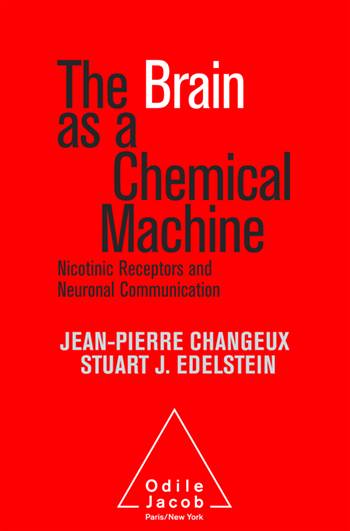
Je cadeautjes zeker op tijd in huis hebben voor de feestdagen? Kom langs in onze winkels en vind het perfecte geschenk!
- Afhalen na 1 uur in een winkel met voorraad
- Gratis thuislevering in België vanaf € 30
- Ruim aanbod met 7 miljoen producten
Je cadeautjes zeker op tijd in huis hebben voor de feestdagen? Kom langs in onze winkels en vind het perfecte geschenk!
- Afhalen na 1 uur in een winkel met voorraad
- Gratis thuislevering in België vanaf € 30
- Ruim aanbod met 7 miljoen producten
Zoeken
The brain as a chemical machine E-BOOK
Nicotinic receptors and neuronal communication
Jean-Pierre Changeux, Stuart J. Edelstein
E-book | Frans
€ 49,99
+ 49 punten
Omschrijving
The purpose of this book is to give a clear and straightforward account of the remarkable properties of the nicotinic receptor for acetylcholine, a membrane protein involved in chemical transduction in the nervous system that is also the target of a widely used drug, nicotine. This molecule also happens to be the first pharmacological receptor and ion channel ever to have been identified. Jean-Pierre Changeux has played a leading role with Stuart J. Edelstein in the investigation of nicotinic acetylcholine receptors and allosteric proteins. The aim of this book is not only to review the most recent experimental and theoretical breakthroughs in the study of the nicotinic receptor, but also to give the reader a sense of the intellectual excitement and adventure that accompanied the various stages of discovery. The story of the receptor for acetylcholine provides a unique perspective on the development of a branch of science at the crossroads of four major domains: biochemistry, neurophysiology, pharmacology, and the behavioral sciences. An understanding of nicotinic receptors can help patients suffering from a range of neurological and psychiatric discorders, among them Alzheimer's and Parkinson's diseases, Tourette's syndrome, nocturnal frontal lobe epilepsies, and possibly schizophrenic syndromes and autism as well - to say nothing of addiction to nicotine itself. For forty years now the nicotinic receptor has served as an outstanding model of signal transducers and pharmacological receptors. This richly illustrated volume furnishes an exceptional opportunity for scientists and students to follow the course of a major advance in our understanding of the molecular basis of brain functions. "The nicotinic acetylcholine receptor has served for many decades as the prototype for neurotransmitter receptors. Acetylcholine was the first neurotransmitter shown to be involved in the fonction of the mammalian brain and its nicotinic receptor the first receptor to be characterized. Jean-Pierre Changeux is the indisputable pioneer in this field. This volume summarizes with great lucidity the history of a highly important topic in neuroscience." Paul Greengard, Nobel laureate in Medecine - The Rockefeller University "From the molecule to thought itself - an extraordinary journey! Changeux and Edelstein are uniquely qualified to relate this utterly fascinating story, whose philosophical implications are no less important than the scientific research underlying them." Jean-Marie Lehn, Nobel laureate in Chemistry - ISIS-Université Louis Pasteur, Strasbourg "The human brain is as much a chemical as an electrical network. Its intricacy and sophistication set it apart from any known technical device. The groundbreaking papers by Monod, Jacob, Wyman, and Changeux in the 1960s on chemical regulation and control were eye-opening for all us who were doing experimental research in ths field, and they have turned out to be crucial for understanding biological evolution and learning in a broad sense. Since then Changeux and Edelstein have achieved international fame for their work on nicotinic acetylcholine receptors, amply documented in this masterful account." Manfred Eigen, Nobel laureate in Chemistry - Max Planck Institute for Biophysical Chemistry, Göttingen "One hesitates to call this book a monograph, for despite its comprehensive treatment of a complex subject it is not meant solely for specialized readers. In concentrating on a single class of neuroreceptors, the nicotinic acetylcholine receptor, it seeks to draw out general principles which apply more widely. It will therefore be welcomed not only by serious workers and students in the field of neurobiology, but also by anyone interested in the broader field of neuroscience." Sir Aaron Klug OM FRS, Nobel laureate in Chemistry - University of Cambridge "Changeux and Edelstein have provided a concise yet highly comprehensive account of perhaps the prototypical neurotransmitter complex, the nicotinic acetylcholine receptor. The story of how the roles played by this signal transduction system in nicotine dependence, learning, memory, and the processes of cognition came to be unraveled is an exciting saga, both beautiful and profound. A lovely historico-scientific document." Floyd E. Bloom, Professor Emeritus - The Scripps Research Institute "Changeux and Edelstein describe a classically Cartesian process of scientific investigation that leads to a most non-Cartesian conclusion. Having elucidated the mechanisms of action and interaction by which the various elements that make up the nicotinic acetylcholine receptor operate throughout the nervous system, from neuromuscular junctions to the brain itself, the authors turn to the role of thse structures and mechanisms in supporting cognition and giving access to consciousness - thus parting ways with Descartes and the view that the mind is able somehow to exist independently of the body. A work of truly remarkable erudition and insight." Roger Guillemin, Nobel laureate in Medicine - Salk Institute for Biological Studies
Specificaties
Betrokkenen
- Auteur(s):
- Uitgeverij:
Inhoud
- Aantal bladzijden:
- 284
- Taal:
- Frans
Eigenschappen
- Productcode (EAN):
- 9782738179470
- Verschijningsdatum:
- 31/03/2005
- Uitvoering:
- E-book
- Beveiligd met:
- Digital watermarking
- Formaat:

Alleen bij Standaard Boekhandel
+ 49 punten op je klantenkaart van Standaard Boekhandel
Beoordelingen
We publiceren alleen reviews die voldoen aan de voorwaarden voor reviews. Bekijk onze voorwaarden voor reviews.









